Microbiological safety cabinets and compliance with BS EN 12469:2000
Microbiological safety cabinet testing is key to protecting operators, their environment, and the product being worked with. But how often should safety cabinets be tested, and why do they need to be tested? Safety cabinets must be tested and checked when necessary to confirm that they are in good working order. Safety cabinets need to be compliant with BS EN 12469:2000, so regular testing is required to ensure they meet the performance criteria for microbiological safety cabinets.
BS EN 12469:2000 specifies the basic requirements for microbiological safety cabinets (MSCs) concerning safety and hygiene. This standard sets the minimum performance criteria for safety cabinets for work with micro-organisms. It specifies test procedures for microbiological safety cabinets concerning protecting both the worker and the environment, product protection and cross-contamination. A copy of BS EN 12469:2000 can be purchased on the BSI site here.
What type of performance and safety tests are available?
Several different performance and safety tests can be carried out to ensure that a microbiological safety cabinet is in good working order and is compliant. Tests include operational checks to ensure that all parts of the cabinet are working as they should to an in situ HEPA filter leak integrity test, airborne particle counting test, airflow velocity checks, and light and noise level checks.
How often does a safety cabinet need to be tested?
How often a safety cabinet needs to be tested depends on what it is being used for. Class I, II, and III safety cabinets should be tested annually to ensure that they remain in good working order. If a safety cabinet filter is being replaced, then a further test can be carried out.
When a laboratory is containment level 3 or 4 and works with HG3 and HG4 agents (biological agents; bacteria, viruses, parasites and fungi which can cause harm to human health), a safety cabinet should be tested at least every six months.
Who can test a safety cabinet?
To ensure that a safety cabinet is properly tested and is compliant with BS EN 12469:2000, a company should engage a qualified and experienced engineer to carry out the testing.
Become a "No Fee" Member of the CCN for access to back Issues of the CACR Journal

